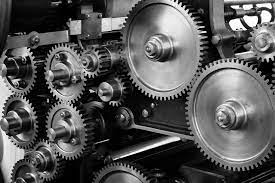The Evolution of Machines
From the earliest tools crafted by our ancestors to the sophisticated machines of the modern age, the evolution of machines has been a remarkable journey that has shaped human civilization in profound ways.
Throughout history, machines have played a crucial role in revolutionizing industries, increasing efficiency, and expanding human capabilities. The invention of the wheel, the printing press, and the steam engine are just a few examples of how machines have transformed society.
As technology advances at an exponential rate, we are witnessing a new era of machines that are smarter, more connected, and more autonomous than ever before. From artificial intelligence and robotics to 3D printing and nanotechnology, these cutting-edge technologies are pushing the boundaries of what machines can achieve.
In today’s digital age, machines are not just tools but integral parts of our daily lives. We rely on smartphones, computers, and other devices to communicate, work, and navigate the world around us. The Internet of Things (IoT) is connecting these machines in ways that were once unimaginable, creating a networked ecosystem that is reshaping industries and societies.
Looking ahead, the future of machines holds even greater promise. With advancements in quantum computing, biotechnology, and renewable energy systems, we are on the cusp of a new era where machines will not only augment human abilities but also help us tackle some of the most pressing challenges facing our planet.
As we continue to innovate and push the boundaries of what is possible with machines, it is essential that we do so with careful consideration for ethical implications and societal impact. By harnessing the power of machines responsibly and ethically, we can ensure that they remain powerful tools for progress and prosperity for generations to come.
Understanding the World of Machines: Definitions, Mechanics, Varieties, Benefits, and Societal Impact
- What is a machine?
- How do machines work?
- What are the different types of machines?
- What are the advantages of using machines?
- How are machines changing industries and society?
What is a machine?
A machine is a mechanical or electronic device designed to perform a specific task by utilizing energy to achieve a desired output. Machines come in various forms and sizes, ranging from simple tools like levers and pulleys to complex systems such as computers and robots. Essentially, a machine transforms input (such as energy, materials, or information) into output through a series of interconnected components and mechanisms. Whether it’s a basic hand tool or a sophisticated piece of technology, machines play a vital role in enhancing human productivity, efficiency, and capabilities across diverse industries and applications.
How do machines work?
Machines work by utilizing a combination of mechanical, electrical, and/or electronic components to perform specific tasks or functions. At their core, machines convert input energy into mechanical work output through a series of interconnected parts and mechanisms. Whether it’s a simple lever or a complex computer-controlled system, the fundamental principle remains the same: input energy is transformed and manipulated to produce the desired output. Understanding how machines work involves delving into the intricate design and operation of each component to comprehend how they interact and collaborate to achieve their intended purpose.
What are the different types of machines?
Machines come in a variety of types, each designed for specific functions and purposes. Common categories of machines include simple machines like levers, pulleys, and inclined planes that provide mechanical advantage for tasks such as lifting or moving objects. More complex machines include engines, turbines, and robots that perform intricate operations with precision and efficiency. Additionally, machines can be classified based on their application, such as agricultural machinery, industrial equipment, or medical devices. The diverse range of machines available showcases the ingenuity and innovation of human engineering throughout history.
What are the advantages of using machines?
Using machines offers a multitude of advantages that have revolutionized industries and daily life. One key benefit is increased efficiency and productivity, as machines can perform tasks at a much faster rate than humans while maintaining consistency and precision. Machines also enhance safety by handling dangerous or strenuous tasks that may pose risks to human workers. Additionally, machines can operate in harsh environments or conditions that are unsuitable for humans, expanding the range of tasks that can be accomplished. Overall, the advantages of using machines include improved efficiency, enhanced safety, increased productivity, and the ability to tackle challenging tasks with ease.
How are machines changing industries and society?
Machines are revolutionizing industries and society in profound ways by enhancing efficiency, productivity, and innovation. In industries ranging from manufacturing to healthcare, machines are automating tasks, streamlining processes, and enabling the creation of new products and services. This transformation is not only increasing economic output but also reshaping the nature of work and skill requirements. Moreover, the integration of smart technologies and artificial intelligence is paving the way for a more connected and data-driven society where machines play a central role in decision-making processes. As machines continue to evolve and become more sophisticated, their impact on industries and society will only continue to grow, driving progress and shaping the future landscape of our world.

No Responses